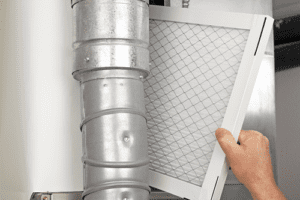“Can air filters be recycled?” In both the residential and commercial sectors, this question tends to come up frequently. Air conditioning and furnace filters need to be changed out regularly to ensure the continued efficiency of an HVAC system and to protect air quality throughout a building. To avoid needless waste, homeowners and business owners are drawn to the idea of recycling these dirty filters. Unfortunately, recycling a filter might a bit more complicated than people typically realize.
What Are Air Filters Made Of?
 The first impulse for most people is to toss an old HVAC air filter into the recycling bin. Especially in the case of residential HVAC filters, they genuinely look and feel as if they should be recyclable. The frames are made of cardboard, and the filter material itself has the texture of fabric or paper. As a result, many homeowners don’t think twice before recycling their used filters. Commercial filters, which are a bit larger and heavier-duty—and are often made of fiberglass and other materials—cause a bit more confusion.
The first impulse for most people is to toss an old HVAC air filter into the recycling bin. Especially in the case of residential HVAC filters, they genuinely look and feel as if they should be recyclable. The frames are made of cardboard, and the filter material itself has the texture of fabric or paper. As a result, many homeowners don’t think twice before recycling their used filters. Commercial filters, which are a bit larger and heavier-duty—and are often made of fiberglass and other materials—cause a bit more confusion.
In truth, no furnace filters or air conditioning filters should be going into the bin with the rest of the week’s recycling. While some components of the filter—such as cardboard—are easily recyclable, the filters themselves are complex in construction and include various materials. Depending on the type of filter you are working with, it might be comprised of cardboard, fiberglass, plastic, wire, metal, woven mesh fibers, and more. Cardboard and plastic may be recyclable, but components such as fiberglass or polyester (often part of the filter mesh) are not. Furthermore, there is not a cost-effective way to disassemble HVAC filters, separate the different recyclable components, and make sure those components get where they need to go.
The other factor is all the dust, dirt, and debris captured in the filters. These filters have been used, for months at a time, to keep unwanted contaminants out of the air in your home or building. Just as you don’t want to be breathing in all that debris on a day-to-day basis, no one working in a recycling center wants to release it all into the air either.
For all these reasons, when an HVAC filter gets to the recycling center, you can safely assume that they won’t know what to do with it any better than you do.
Disposing of HVAC Air Filters
So, can air filters be recycled? If you are speaking strictly of city or county recycling policies, then the answer is almost always no. Furnace filters and air conditioning filters are on the “do not recycle” list in most cases, alongside televisions and other electronics. However, just as there are special entities that can recycle electronic devices in a safe, environmentally conscious way, there are also paths you can take to recycle used air filters.
Certain HVAC suppliers or manufacturers will accept used filters and recycle them for customers. You can use the website Recycle Smart to find out if there are filter recycling options near you. Also, there are mail-in recycling services—such as TerraCycle—that offer eco-friendly ways to dispose of filters. The drawback, unfortunately, is that some of these services cost money. Rather than go through the hassle, many homeowners or businesses will simply opt to dispose of their used filters in the trash.
If you do decide to throw old filters away rather than recycling them, take care to make sure you are doing so safely. You don’t want the particles that the filter captured to escape into the air again. Placing the filter in a large plastic bag and sealing it will help prevent additional environmental impact due to filter-captured particles or debris.
If you are still interested in recycling your filters, ask your HVAC technician for recommendations on what to do. An HVAC professional should be able to offer tips based on the type and brand of filter you are using, as well as the construction of your filter and the materials it contains. Your HVAC technician might also be able to recommend a reusable filter for your HVAC system, or at least a more efficient filter than the one you are using. Reusable filters are becoming increasingly common in the HVAC industry, thanks to their significant environmental benefits. These filters are washable and can last for years at a time, so long as they are cared for properly. They come with a bigger upfront investment than disposable filters but can function just as efficiently and deliver a bigger ROI over time.
In any case, you should continue to maintain your HVAC system regularly and vigilantly. Changing out your filters every three months, while it may seem wasteful, is the best practice for ensuring an efficient system and protecting the air quality throughout your home or business. Also, whether you are looking for tips on HVAC maintenance or looking for answers to questions such as “Can air filters be recycled?”, a trusted HVAC technician can help. Calling for an annual HVAC checkup will keep your system operating in top form.

